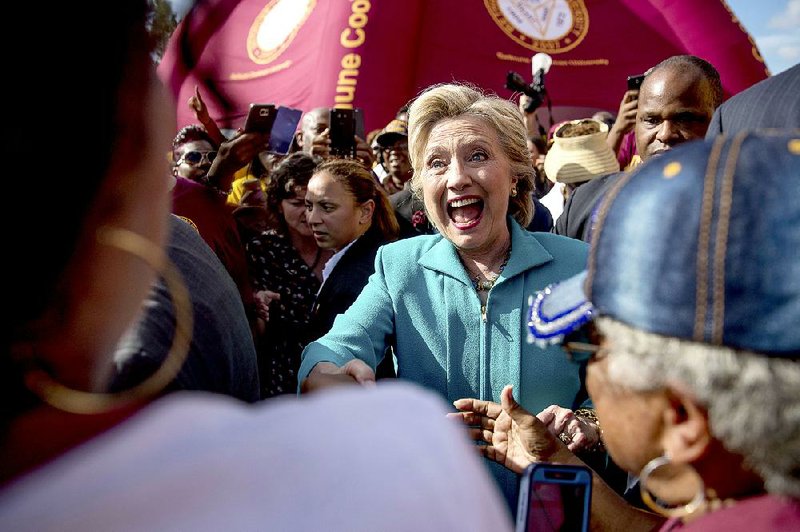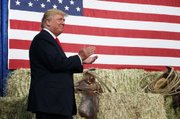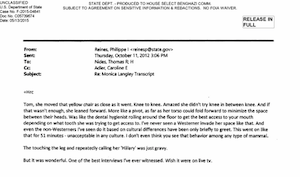DAYTONA BEACH, Fla. -- Hillary Clinton lashed out Saturday at the FBI's handling of a new email review, leading a chorus of Democratic leaders who condemned the bureau's actions just days before the election and calling the FBI director's action "unprecedented" and "deeply troubling."
RELATED ARTICLE
http://www.arkansas…">Justice officials objected to Comey's letter
Emboldened Republican presidential nominee Donald Trump seized on the reignited email controversy, seeking to raise new doubts about Clinton's trustworthiness.
Rallying supporters in Florida, the Democratic presidential nominee pressed FBI Director James Comey to put out the "full and complete facts" about an inquiry into some recently discovered emails. Clinton backers said the letter that Comey sent Friday to some members of Congress telling them about the new emails was severely lacking in crucial details.
"It is pretty strange to put something like that out with such little information right before an election," Clinton said. "In fact, it's not just strange, it's unprecedented and it is deeply troubling. Voters deserve to get full and complete facts."
[INTERACTIVE: 2016 election coverage]
She accused Trump of using the issue to confuse and mislead voters in the final leg of the campaign for the Nov. 8 election.
Clinton stopped just short of accusing Comey, once a registered Republican, of partisan interference in the election. She did not attempt to conceal her anger, although she went on to urge unity and optimism.
The controversy over Clinton's email practices at the State Department has dogged her for more than a year. The former secretary of state has often been reluctant to weigh in on the matter -- and defensive when she's been pushed to do so.
But Clinton's approach to the latest flare-up is markedly different, underscoring worries that the matter could damage her standing with voters in the campaign's final days. Some Democratic lawmakers and other supporters have rallied to her defense, including members of the Congressional Black Caucus.
Earlier Saturday, Clinton campaign chairman John Podesta said there was "no evidence of wrongdoing" in the new email review and "no indication this is even about Hillary."
But Comey, who enraged Republicans over the summer when he announced that the FBI would not prosecute Clinton for her loose handling of official email, said the new trove appeared to be "pertinent" to the Clinton email investigation. He did not explain how.
A government official said Saturday that the Justice Department had advised the FBI against telling Congress about the new developments in the Clinton investigation because of the potential fallout so close to the election. The official was not authorized to speak publicly about the matter and discussed it on condition of anonymity.
Justice officials concluded that the letter would be inconsistent with department policy that directs against investigative actions that could be seen as affecting an election or helping a particular candidate, the official said.
Trump responded to that news Saturday at a Phoenix rally, where he accused the Justice Department of doing everything it can to protect Clinton. He also repeated his claim that the development represents the biggest political scandal since Watergate.
"It's everybody's deepest hope that justice, at last, will be beautifully delivered."
Landing with a thud, the email issue again threatened to undermine an advantage built up by Clinton over Trump and raised the possibility that the Republican would get some late momentum.
Weiner computer
Trump told a crowd in Golden, Colo., earlier Saturday that the FBI's review of Clinton email practices raises "everybody's deepest hope that justice, at last, can be properly delivered." His crowd cheered over Clinton's email woes, which Trump has taken to calling the biggest political scandal since Watergate.
The FBI is looking into whether there was classified information on an electronic device belonging to Anthony Weiner, the ex-congressman who was married to, but is now separated from, longtime Clinton aide Huma Abedin.
Comey, in his Friday letter to Congress, said the FBI recently come upon new emails while pursuing a case against Weiner and was reviewing whether they were classified.
A person familiar with the investigation, who lacked authority to discuss the matter publicly and insisted on anonymity, said the electronic device that appears to be at the center of the new review was not a computer that Weiner shared with Abedin.
Because of that it was not one of the devices searched for Clinton work-related emails at the time of the initial investigation. The person said "this is news to [Abedin]" that her emails could be on a computer belonging to her husband.
Trump mused aloud during his rally about whether Clinton was "going to keep Huma," adding that Abedin has "been a problem." He hurled insults at Weiner, warning again that the former congressman posed a national security risk because of his access to information through his estranged wife. Abedin, a close Clinton confidant who is a near constant presence in the campaign, was not traveling with Clinton on Saturday.
The emails development prompted a mixture of shrugs and renewed determination from the left and told-you-so claims of Clinton deceitfulness from the right.
"My mind was made up," said Luis Luaces, 57, a Florida Republican who expressed little surprise about the Weiner email twist as he cast his ballot for Trump on Saturday in Miami. "I know what the Clintons are about."
Democrats also said the development had done little to alter their perceptions. In Charlotte, N.C., Ian Leemans, 35, a Democrat, said he had been at work checking news sites when he saw a flashing banner with Friday's news. He had already planned to vote early for Clinton, but after the news, he felt even more urgency to cast his ballot.
"I thought, OK, this is going to be an advantage for Trump people to say, 'Oh, it is a rigged election,'" Leemans said. "So I thought, 'Oh, I need to make sure I get up at 8 o'clock on a Saturday and vote.'"
Blasts at Comey
The congressional black and Hispanic caucuses organized a news conference to denounce Comey, at least three Democratic senators drafted a letter of complaint Saturday and the Democratic National Committee issued a tartly worded statement.
"By releasing a letter within sixty days of the presidential election, FBI Director James Comey broke with long-standing department tradition that is meant to prevent any influence on the electoral process," the committee's statement said.
"The letter did not offer enough detail that would allow Americans a full understanding of the development and whether or not it is even significant, which has led to speculation on the part of the media and irresponsible claims by Republican leaders. The FBI must move quickly to release additional clarifying information."
Rep. Gregory Meeks, D-N.Y., suggested that the FBI chief might be trying to sway the election and called for him to disclose what he knows. Clinton said of Comey: "Put it all out on the table."
Later Saturday, four senior Democratic senators called on the Justice Department and the FBI to promptly release more information on the emails, claiming Comey's letter was being used for political purposes and has led to a misleading impression about the FBI's actions and intentions.
The letter was sent to Comey and Attorney General Loretta Lynch by Sens. Benjamin Cardin of Maryland, Thomas Carper of Delaware, Patrick Leahy of Vermont and Dianne Feinstein of California.
Long term, the emails development all but ensure that, even if Clinton wins the White House, she would celebrate the victory under a cloud of investigation. Comey, who was appointed in 2013 to a 10-year term as FBI director, would still be on the job if Clinton wins the White House.
Congressional Republicans have already promised years of investigations into Clinton's private email system. And that's only one of the email-related episodes facing her in the campaign's closing days. The tens of thousands of confidential emails from Clinton campaign insiders that were hacked -- her campaign blames Russia -- and then released by WikiLeaks have provided a stream of questions about her policy positions, personnel choices and ties with her husband's extensive charitable network and post-presidential pursuits.
In his letter to congressional leaders Friday, Comey wrote only that new emails have emerged, prompting the agency to "take appropriate investigative steps" to review information that appeared pertinent to its previously settled investigation into Clinton private email system.
Trump contribution
Meanwhile, Trump contributed another $10 million to his presidential campaign, providing a needed financial boost to his bid at a critical juncture.
Trump's donation was revealed in disclosures filed late Friday with the Federal Election Commission. He had pledged to make the donation in an interview aired earlier in the evening with the Fox New host Bret Baier.
The donation came after earlier disclosures, filed Thursday, revealed that the Republican nominee had not contributed any cash to his campaign in October despite claims that he would be spending heavily and despite earlier pledges to match the small contributions of his grass-roots supporters. That earlier disclosure covered only the first three weeks of October. Trump typically wires money to his campaign toward the end of the month.
The donation moves Trump closer to his promise of spending $100 million of his own money on his presidential bid, which he says would allow him to remain clear of the influence of special interests. As of Friday, he had contributed $65.5 million in cash and $500,000 of in-kind rent and staff salaries.
As of mid-October, Trump had only $16 million in cash on hand, a small amount for a modern presidential campaign, and additional cash in joint accounts he controls. Clinton had $62.4 million.
Information for this article was contributed by Julie Pace, Ken Thomas, Jill Colvin, Eric Tucker, Kathleen Hennessey and Steve Peoples of The Associated Press; by Anne Gearan, Sean Sullivan, John Wagner and Jenna Johnson of The Washington Post; and by Nicholas Confessore of The New York Times.
A Section on 10/30/2016


